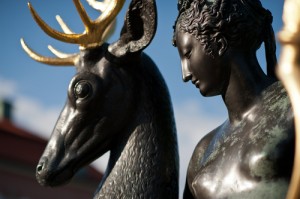O do not tell the priests our plight, or he would call it sin, but we have been in the woods all night, a conjurin’ summer in.”
“And you shall be free in your rites…

Moon-blessed water, herbs gathered on Midsummer’s eve, tricksters’ tales, and the myriad uses of bones, roots, and stones. Folk magic and folk tales are embedded in every culture, and yet are dismissed as superstition by many. But- let’s face it- is there anything more deliciously transgressive then magic and folklore?
Charles Godfrey Leland’s famous book Aradia, or, the Gospel of the Witches, has had an impact on the modern earth traditions- even though scholars debate whether the material gathered by his primary source- a mysterious Tuscan witch named Magdalena- was truly authentic. One of the principal themes of the book is the use of witchcraft to thwart oppressors. The Goddess of the Witches is there to aid those who wish to be free- free from feudal oppression, and free from priests, who are mentioned as possessing treasure. (There is a whole chapter of spells devoted to enlist the aid of the Goddess of Thieves, Laverna. )
Despite the dubious ethics evidenced in the book, The Gospel of the Witches contains beautiful poetry which eventually made its way into the Charge of the Goddess, one of the most recognized poems of contemporary Paganism, which was reworked by Doreen Valiente and eventually Starhawk. Although many think of the Charge as describing the spiritual freedom that comes from aligning oneself ecstatically with nature, that does not seem to be the primary focus of the incantations contained in Leland’s compendium of Italian folklore.
Trickster tales can be found in the folklore of all major cultures- one prime example from Norse Mythology being the Loki, who is always willing to stir up trouble between the Gods. There are even trickster tales in the Hebrew Bible — as when Rebecca tricks Isaac into bestowing his birthright onto her favorite son Jacob rather than onto his first born, Esau. Tricksters work to transgress the natural order of things because without rough patches human beings seldom learn. Moreover, the trickster also, in his or her devious way, gives us hope that within the universe there are those with the power to subvert the powerful and upend the natural order.
In upcoming blog posts, I hope to delve more deeply into famous collections of folklore with an eye towards exegesis- finding the inherent meaning of the texts- and how these stories, spells, and charms can inform what we know about the past and form the basis for the folk-soul that we are living today. Although I am no anthropologist, it is my contention that a wellspring of meaning, valuable to both children and adults, can come from this material. I hope you stick around for the ride!
















